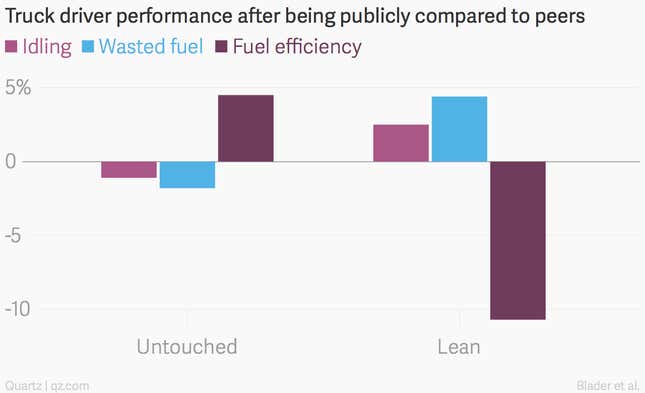It’s possible to rank employees in entirely new ways in the age of big data. People in sales are used to seeing their numbers compared. But now everything from how well truck drivers drive, to individual author web traffic and how quickly engineers write code can be quantified in great detail.
Companies need to be careful about how they use that information. Ranking people publicly, even if it’s done with the intention of creating friendly competition or transparency, can backfire depending on a company’s culture.
In a new study of a trucking company in the midst of adopting Toyota’s famous lean principles (which emphasize respect, humility, and collective outcomes over individual ones) researchers from NYU and Columbia found that putting up a leaderboard comparing individual performance had vastly different effects, depending on whether or not an individual site had undergone the new cultural training.
The leaderboard is populated through an on-board recorder that transmits detailed driving behavior. In the sites that maintained the original, more individualistic culture, comparative rankings boosted performance substantially.
It had the exact opposite effect in the places that had started the transition to the Toyota-inspired system. And this was before any major policy changes; after only informal training, the drivers at these facilities had the opposite reaction to seeing themselves ranked publicly. Their performance was marked by dramatically lower fuel efficiency, more wasted fuel, and more time spent idling:

The authors believe it all came down to the change in mindset prompted by the new cultural initiative. The workers were told, essentially, that they were to be rewarded for collective achievement rather than individually. So instead of maximizing individual satisfaction, which often comes through competition with other people, employees considered their impact on colleagues. The theory, which plays out in the results, is that with relative rankings, top performers reduce their effort to avoid hurting their co-workers’ egos and to prevent schisms in the team.
There are relatively few workplaces these days that don’t encourage collaboration. If companies are confident that they’ve succeeded in creating such an atmosphere, they may want to think twice before putting everybody’s performance data out in the open.
The study is also a reminder that it pays to be skeptical of management advice from other companies. Just because something works in one setting doesn’t mean it’s universal. That was true even within a single company, in this particular case.
“If we had run the same experiment in 2012 before the beginning of the switch to lean, we would have found overwhelming support for relative rankings,” the authors write. “If we had run it after all sites have switched to lean, we would arguably obtain the opposite conclusion.”
